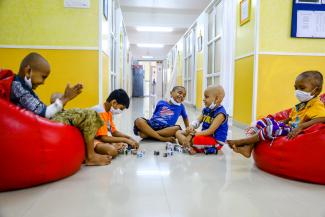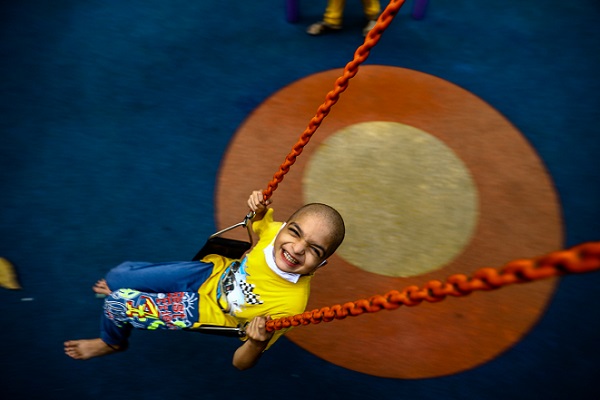
Mrunal Marathe, counsellor at St Jude India Childcare shares the challenges, fears and insecurities faced by children and teenagers affected by cancer and the impact on their families.
What are the growing concerns of parents who have children with cancer?
The first and largest problem is that most people aren’t aware that cancer is a disease that can affect children. Cancer is perceived as something adults get. After a diagnosis, parents often blame themselves and believe that is was something in the child’s diet or hygiene that could have caused it.
Have you noticed any specific trends in recent years?
The number of diagnosed cases is increasing and we also have seen several infants who have been diagnosed.
A positive development that we have seen is that more families are putting the same effort and resources in to treating girl children, as they do for male children. When we began our work more than ten years ago, we saw that families would abandon treatment more frequently if it was for a girl child and this was very heartbreaking to see these gender biases.
Medical research and treatments are improving constantly and so we are glad to see high cure rates for pediatric cancers, especially certain kinds like leukemia.
What challenges do teenagers face during their cancer journey?
For teenagers, the world is a place full of energy and enthusiasm and they are keen to discover it on their own terms. So a teenager with cancer does a lot of research and information gathering through the internet and other sources. They want to be educated on their condition.
The teen years are also a time of physical development and heightened self awareness so the biggest challenge teenagers with cancer face is the changes to their body. Things like hair loss, weakness, and weight loss affect their self esteem.
What tools do you use to help them cope with these challenges? Please provide examples.
At St Jude we focus as much on the emotional needs of the children as we do on the physical needs. During their stay with us, we try and ensure that they feel like children first, and cancer patients second. So from the beginning we create an atmosphere of positivity and hope that surrounds the children and their families.

We provide in-depth one to one counselling as well as group counselling. Our approach includes being honest with the child, answering their questions, and helping them understand that it is normal to be sad or angry. Providing honest information on the effects of chemotherapy helps set expectations for the children.
Another important way to help them cope is getting them together in peer to peer sessions with other teenagers so that they can share common experiences and know that they aren’t alone or singled out for what they sometimes perceive as a “punishment”.
Creative pursuits are a great outlet for negative feelings and so we employ art and music therapies at our centres.
What challenges do siblings of patients commonly face? Are siblings often summoned for bone marrow donation?
Since the families staying at St Judes travel from small villages and rural areas to get their child treated for cancer, we don’t typically meet the siblings who are still in their native place. However, we know that siblings develop issues around being separated from their parents for long stretches. Sometimes a sibling has to be uprooted from their native place to go and live with relatives in another place while the parents take the child for treatment. They can find it difficult to adjust to a new home, new family and surroundings. Also the financial burden on the family can have effects on the other siblings.
In cases where Bone Marrow Transplant is considered as curative treatment option, the siblings are called for HLA typing which is a type of test to find a prospective donor. Often the siblings have to travel a long distance from their remote village to come to a large city for this procedure.
How do young adults find the transition to normal life after treatment?
One of the areas that young adults are most anxious about is the break in their education. They worry about lagging behind their classmates upon return to school which is why we support them to keep up their learning as far as possible during their stay with us.
Bringing School and Normalcy to Children with Childhood Cancer
There is also an insecurity about leaving the hospital and treatment and going home with regard to a relapse or the chance of contracting an infection once they are away from the safety net of St Judes.
Do children find it difficult to move on? What fears do you commonly come across?
The most common fears are
- fear anticipated social reaction /rejection
- fear of infection
- fear of relapse
- few express fear of death
- fear of losing a friend made at St Judes, another child with cancer
Help Children With Cancer Develop Skills to Manage Sress and Anxiety
How do you help them overcome challenges that they face with returning to college/school?
At St Judes the majority of our patients are in grade school while a few are of college age. Our counsellors encourage teens to stay with their education (where possible), and to continue meeting friends and participating in social activities because isolation leads to more emotional issues. We help the children get a certificate from hospital which helps them get re-admitted in school.
Mrunal Marathe has been a counsellor at St Jude India Childcare for more than 5 years and has been involved with oncology counselling for twenty years. She has a Masters degree in Psychology and a PhD from Tata Institute of Social Sciences.
St. Jude India ChildCare Centres is a not-for-profit organization in India that provides free of charge shelter and holistic care to children who are undergoing cancer treatment along with their families.






